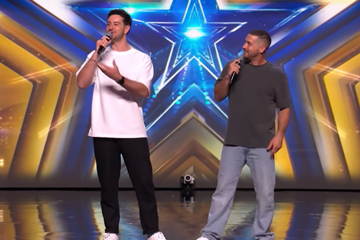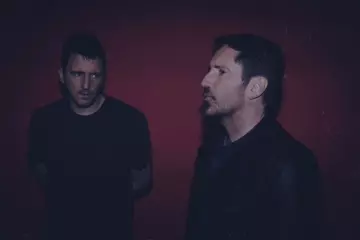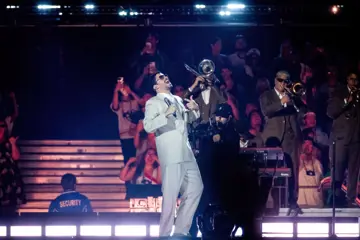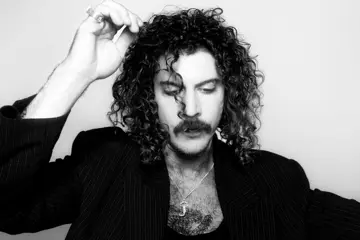Sydney outfit Royal Headache are indeed kings of the Australian underground guitar scene, their intoxicating mix of jubilant garage guitars and frontman Shogun’s soulful, expressive vocals and unapologetically personal lyrics giving them immense power and gravitas both on their recordings and in the live realm.
The four-piece first came to national attention when their eponymous 2011 debut garnered almost universal acclaim, yet the scrutiny that accompanied this adulation saw the band adopt a siege mentality that they almost never recovered from. Their incredible second album, High, actually sat in the can for nearly three years, and for the longest time it seemed like it would never see the light of day at all, with various band members actually calling the band’s existence into doubt online before sanity and a much-needed break prevailed.
"Rehearsing for all of these kinda big shows that were to people who didn’t really care who we were or what we did … That’s always the worst thing for a band to be in that situation.”
“We recorded it at the end of 2012, and that year was a bit hectic – we started doing stuff that we were maybe not very comfortable with,” reflects bassist Joe Sukit (presumably still Joe Davies-Griffith to the taxman). “We played all of these Entertainment Centres with The Black Keys, and it was a bit weird going out and playing to 20,000 people that hate you. We were kinda just like, ‘What are we doing?’ and we were working really hard on all these new songs, and then went in to record and listened back to it and we were just… maybe a bit disillusioned and over being in the band or something, and we thought the album wasn’t very good.
“So we just took a break for a bit and just did other stuff, and then we came back and sort of listened to it again and realised that it was okay and just decided to finish it off. We kinda always said that we’d worked hard on it and we should try to at least get the record out, but I dunno, it just ended up being this weird process where we started playing together again – when we started mixing the record we started playing again with the idea that we would do one last tour of shows. Then we were, like, ‘Ah, let’s just keep going I guess, we’ll see how it goes for now’.
Don't miss a beat with our FREE daily newsletter
“I dunno, everyone’s kinda enjoying it, it’s just that in that little time period we weren’t really getting to work on much new stuff and we sort of felt a bit stifled: it was just like rehearsing for all of these kinda big shows that were to people who didn’t really care who we were or what we did. That’s always the worst thing for a band to be in that situation.”
While the idea of Black Keys fans having the temerity to diss Royal Headache seems both incongruous and disturbing, that negativity had a definite impact on the group’s psyche.
“[Playing high profile supports is] just a weird thing to do as a band – everyone was like, ‘But you’re exposing yourself to all of these different people’, and we were like, ‘No, it’s just 20,000 people who actively hate you!’” Sukit laughs. “People actively searched us out on the internet to find us and be like, ‘Don’t quit your day jobs!’ and all this shit, and we were, like, ‘Man, this is just a hobby!
We’re really not doing this for anything else!’ Anyway, whatever. It’s a weird thing but I guess that kinda got into our heads a bit. We’re not the most confident people at the best of time, and then you have a bunch of people telling you that you’re shit, it was like, ‘Oh well, I guess they’re right’.”
Fortunately rather than splitting the band asunder the time apart during the short hiatus served to help the band prioritise and charge their collective batteries.
"It always ends up ruining bands the more popular they get with feeding egos and all that shit.”
“It just gave us a break from it really,” Sukit continues. “I think we were pretty exhausted by just what we were doing. We all did different stuff in the meantime – Shogun was playing in Low Life a bit on guitar, and we all did these different things. Then when we came back to it we kinda had this mindset that ‘nobody really cared if we were a band or not and nobody even knew if we were a band or not’, and that kinda took all the pressure away from doing anything. That definitely helped.”
Apparently despite their initial reservations about the quality of High, the Royal Headache camp hasn’t been surprised at all the traction and adulation its received – mainly because they’re largely oblivious to it.
“Ah, we try not to pay too much attention to it,” Sukit chuckles. “The more that you read the more sort of depressing it all gets because there’s good stuff but there’s also bad stuff. I dunno, I just try not to think about it – it’s easier not to think about it and just focus on writing good music and just focus on doing the best that we can on that side of things. It’s nice to have people like you, but ultimately it’s almost never a good thing for a band – it always ends up ruining bands the more popular they get with feeding egos and all that shit.”
From a musical perspective Sukit explains that the creative process in Royal Headache is fairly basic, but also very productive when they’re in the right headspace.
“It’s kinda of a half-and-half split – almost half the time Lawrence [Hall – guitar] has got a riff or a song idea and we’ll just jam on it for ages and Shogun will just start singing over the top of it, and that’s one way,” he tells. “Or Shogun will come in with the idea kinda already mapped out – he’ll have the chords mapped out for the melody – and then we just work on it from there. So it either starts with a Lawrence idea or a Shogun idea and we all work it up together as a band.
“We were a pretty prolific band [in the first stage] – there’s probably like a hundred songs that we’ve written that will never see the light of day – but technically we’re not the most versatile type of band. We try and do a bit of different stuff, but we all taught ourselves to play so there’s only so much that we can do. It’s kind of like the stuff that works best and is easiest to write is just the things that come naturally to us. But writing is generally pretty easy – since we’ve been back now we’ve probably got about ten new songs that we’ve been working on, and we’ll put them all in the set and try them out.”
Fortunately for the band this is also the most enjoyable part of the overall process.
“That’s the best part – it’s pretty much the only part that I like!” Sukit chuckles. “I mean the shows are okay, but a band is never as good as when they’re just comfortable and relaxed and working on new stuff and everyone’s just being creative and feeding off that and jamming. That’s when bands are their best, so that’s what I enjoy the most – the times when we don’t have to worry about
rehearsing for a show or something, or worrying about doing whatever, we just go in and play music.”
As well as their fantastic albums the Royal Headache live show a massive part of their armoury – when they’re on song and Shogun is prowling the stage at his acerbic best the band is an incendiary beast, up there with the very best on the Australian, or even global, scene. Sukit explains that they don’t really differentiate between live and in the studio; in both situations they’re focussing on not messing it up.
“Both are just pretty… loose,” he chuckles after a lengthy pause to find the right word. “When we record everyone’s so nervous: Shortty [drummer Chris Shortt] will get completely nervous and neurotic and completely forget songs, and so it’s like we just have to get the one take! I mean we always rush recording, it’s always done in like a day or something.
“And live shows are a bit the same – everyone’s a bit crazy and a bit neurotic and nervous, so everyone plays the songs about three times too fast and we end up exhausted and buggered after ten minutes and can’t play the rest of the set, so we quit after 25 minutes. I dunno, it’s weird and everything’s different, everything’s weird. Basically the only consistent thing about Royal Headache is the unreliability of how we’re going to play.”
They just returned recently from another tour in America – where they’re building a loyal and rabid fanbase – and it’s nice to hear that this collective penchant to mess things up rarely raised its ugly head.
"The shows are okay, but a band is never as good as when they’re just comfortable and relaxed and working on new stuff."
“Every time we go over there it’s just crazy how much more interest builds and how much bigger the shows get,” Sukit marvels. “The last [American tour] was cool – we probably just played too many shows. We’re not very good at being away from home for that long, and we’re a pretty lazy band so we’re not very good at doing the Black Flag touring regimen with a show every night, so by the end it was a bit draining.
“But it was weird – we started off and then the record came out when we were about halfway through the tour and then for the rest of the tour we sold out shows, I think in New York at the end we played four shows and they were all sold out! It’s crazy when you think about – we never thought that anybody would hear our band, and then all of a sudden people from the other side of the world are coming to your show.
“We pretty much just go [to the States] because people ask us to. Kevin [Pedersen] from [NY indie label] What Your Rupture? – he put out our record over there – obviously he likes it when we go over, but it’s sort of like ‘What else are going to do, just sit in Sydney?’ We might as well get a free trip to America from the band. It’s good to do, but I don’t think I could do it full-time, you know how some bands just seem to hop from one place to the next and never stop. I don’t think I could do that.”
Upon return from the States the band decided to eschew traditional Australian capital city launches for High in favour of accepting a string of festival offers – which have found them playing (or about to play) everywhere from Fairgrounds to Laneway to Golden Plains – and Sukit explains that this was primarily done to help them remain autonomous (Royal Headache are self-managed and released High on their own Naked & Vague imprint).
“We sorta just came back [to Australia] and got offered all this stuff for decent money, so we were kinda like, ‘Why not? I guess we should do it’,” he shrugs. “It’s weird because we’ve never really done them before – it’s not something that we thought would ever really suit our band, to be a bit stadium or something. Our songs kinda feed on the energy of a small crowd – or it can go that way sometimes.
“I dunno, we did the Opera House last year and we added a keyboard player [Gabrielle di Georgio] for it who played on the record, and it kinda just gave us a few more options so we could kinda spread out and do a bit more with the set. That’s pretty much what we’re going to try for the next lot of these festival runs.”
Sadly that show at the Opera House – for the Repressed Records showcase as part of VIVID Live – got Royal Headache plenty of media attention for all the wrong reasons. The band – headlining the great line-up which included contemporaries Blank Realm, Exhaustion & Kris Wanders, Superstar, Snake & Friends and Monica Brooks – had their show cut short by security guards and police after over-exuberant fans took advantage of their being no barriers in the stately venue and started dancing onstage with their heroes.
"If the cops had just come in and said, ‘You’ve got to tell everybody to leave the stage’ they would have gone back to their seats and it would have been fine."
“It was weird – from our standpoint it was just an over-reaction by the police,” Sukit offers. “Basically the police were wired to all of the radios of the Opera House security, so when they heard that there was something going on with people being on the stage then all of a sudden all of these police came in and started pushing people or whatever. Before that the security guards were just kinda there to make sure people weren’t knocking over any equipment and shit, and I mean really if the cops had just come in and said, ‘You’ve got to tell everybody to leave the stage’ they would have gone back to their seats and it would have been fine.
“It’s just a shame that we had a bunch of bands that really don’t get too much credit outside of the small scenes that they’re involved in, and we put 1500 people in there – who else does shit like that, Morrissey or someone like that might sell out the Opera House – and it’s a shame that people who could have been talking about how great that was as an achievement rather than the police showing up and cut two songs off our set or something. That part is a shame. Apart from that it was just a bit ridiculous the whole deal, but whatever – that’s what happened, what can you do?”
Looking forwards rather than backwards, Sukit struggles to put apt descriptors to the new tunes that he and his mates have been constructing in this new phase of Royal Headache’s existence, saying we’ll just have to be patient and wait.
“They’re probably slower because we’re all older and can’t play as fast anymore,” he laughs. “I dunno, I think we’re just trying to do more of the same but just trying to write better songs all the time. It’s probably just going to sound like Oasis or something, I dunno. Actually I’m talking out my ass when I think about it because we’ve got fast songs there as well – we’ve got ‘punk’ songs coming too – so who knows, it’s just whatever happens.”
And that’s not the only new music on the distant horizon for Sukit, whose other outfit Bed Wettin’ Bad Boys have been hard at work on the follow-up to their awesome debut album Ready For Boredom (2013).
“We recorded it a while ago, and it’s just been a bit of a process getting it all done,” he reveals. “We’ve all got other shit going on and then the guy who recorded it John Hunter, he did the last Headache record, he’s mentally busy and
always has stuff happening, so it’s kinda just getting the moments when everyone has a spare night off to get it done. We’ve done all the band stuff, we just need to do vocals and then mix it. It should be done soon."















